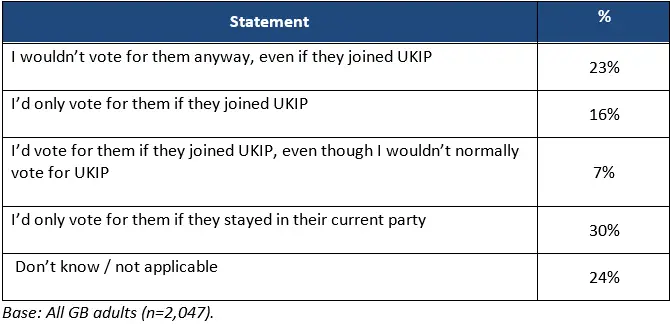However, combine this with 16% of people – largely existing UKIP voters – that say they would vote for their MP only if they joined UKIP, and around one in four (23%) Britons in total would vote for their current local MP if they defected.
As part of PLMR’s pre-election analysis, the public were asked to think about their local constituency MP, and decide whether they would vote for them if they were to switch parties to UKIP.
The poll showed:
- 1 in 13 (7%) adults would vote for their current local MP if they joined UKIP, even though they wouldn’t normally vote for UKIP. This suggests that in theory very few MPs can expect to take their voters with them if they cross the floor of the House.
- 1 in 6 (16%) adults, the majority of which are already UKIP voters (77%), would only vote for their MP if they joined.
There was little difference between Party supporters: 7% of Conservative voters say they would vote for their local MP if they joined UKIP as do 8% of Labour voters and 7% of Liberal Democrats.
However, to offer a note of caution to potential defectors… some 30% of British adults say they would only vote for their local MP if they stayed in the current party while a quarter (23%) say they wouldn’t vote for their local MP at all.
Conservative supporters appear the most steadfast in their support with half (47%) saying they would only vote for their local MP if they stayed in their current party compared to (39%) of Labour voters.
Elin Twigge, Deputy Managing Director of PLMR, said:
“For any MPs with itchy feet, these polls will be a bit of a wake-up call.
With just one in thirteen who wouldn’t usually support Mr Farage’s party, saying they would vote for their local MP if they defected to UKIP, Parliamentarians considering following in Douglas Carswell and Mark Reckless’ footsteps might be
New Polling Shows – MPs with Itchy Feet Might Think Twice | PLMR.co.uk
thinking twice now.
Despite the surge of UKIP, it’s clear there is still significant voter apathy in politics and more than anything, people remain loyal to the political parties they traditionally support, rather than the personalities seeking election.”
Summary of results below:





